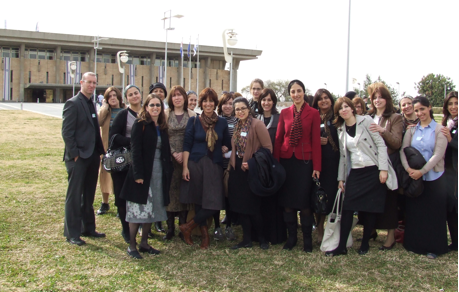Israeli ultra-Orthodox women: Getting to grips with the political landscape

The Interpeace programme in Israel, Base for Discussion (B4D), is facilitating debate with key social groups of Israeli society that were typically excluded from peace efforts. As part of this programme B4D engages with the Traditional Religious population of Israel. Any peace agreement, if it is to be representative will have to also include the views of both male and female members of the religious leaderships.
A request by men to involve women
Interpeace completed an educational programme for the mid-level male leadership of the Traditional Religious population mainly represented by the SHAS social movement. The initiative was so successful the graduates requested for the programme to be extend to the female members of the religious community.
Master’s degree in conflict resolution for ultra-orthodox women
About 40 prominent ultra-orthodox women are now participating in a similar educational programme. Many of the women are leaders within their communities, for example the wife of the chief Sephardic Rabbi of Israel, the daughter of the chief Ashkenazi Rabbi of Israel and the wives of two SHAS ministers etc. The Master’s programme is jointly implemented by Interpeace, the Haredi College of Jerusalem and Ben-Gurion University. Apart from organizing inter-religious encounters, the two year programme teaches English, mediation skills and about the ongoing Palestinian-Israeli conflict.
Typically, ultra-orthodox women have been largely excluded from the political process and the educational programme aims to remedy that. Even though their influence on Israeli society is crucial, ultra-orthodox women are one of the most sidelined groups in Israeli society. The goal of the educational programme is to strengthen the female voice in the ongoing political discussions about the future of Israel.
Visit to the Knesset
The latest women’s event was a visit to the Knesset, the Israeli parliament. This was part of the women’s overall goal to be exposed to the full spectrum of political opinions and learn more about the finer details of the workings of democracy in Israel.
Top of the agenda was the topical issue of the exclusion of ultra-orthodox women from the political arena.
Seen as an innovative initiative, the discussion with the Knesset Committee on the Status of Women was broadcast live on the Knesset TV Channel.
Individual meeting with Members of the Knesset
Individual sessions took place with a selection of Members of the Knesset (MK). MK Dalia Itzik, representing the Kadima party, became the first female speaker of the Knesset in May 2006. She had also previously held a number of ministerial positions. With the group of women she openly shared her insights on life as a female politician.
They also met with MK Nissim Zeev and MK Avraham Michaeli, both Israeli politicians representing SHAS. MK Zeev and MK Michaeli gave details about how the Knesset works and how they, as ultra-orthodox representatives, see their role within parliament. They explained further that in their roles as religious MKs they are trying to lead the nation using the values of the Torah while respecting the democratic essence of Israel.
The meeting with MK Uri Orbakh, an Israeli Religious Zionist writer, journalist and politician, resulted in another open and colorful discussion for the group. Currently serving as a member of the Knesset for The Jewish Home party, he was seen by the participants as having diverse viewpoints. As a journalist he has written challenging and critical articles about the ultra-orthodox community, while on the other hand he supports settlements.
Understanding the essence of democracy
“The day exposed the group to diverse points of view and stimulated thought-provoking discussions. It is only with this type of interaction that the group can get a clear overview of the political landscape and workings of democracy in Israel,” explains Itzik Sudri, Project Officer for the Traditional Religious population.
What next?
Discussions with other MKs are being scheduled including sessions with different Palestinian Arab MKs. The goal is to ensure that the women get the full exposure they are seeking to the different views currently being discussed on the Israeli political agenda.
About the educational programme
The educational programme for ultra-orthodox women in Israel was launched in September 2011. The programme is run by Interpeace in cooperation with the Haredi College of Jerusalem and Ben-Gurion University.
